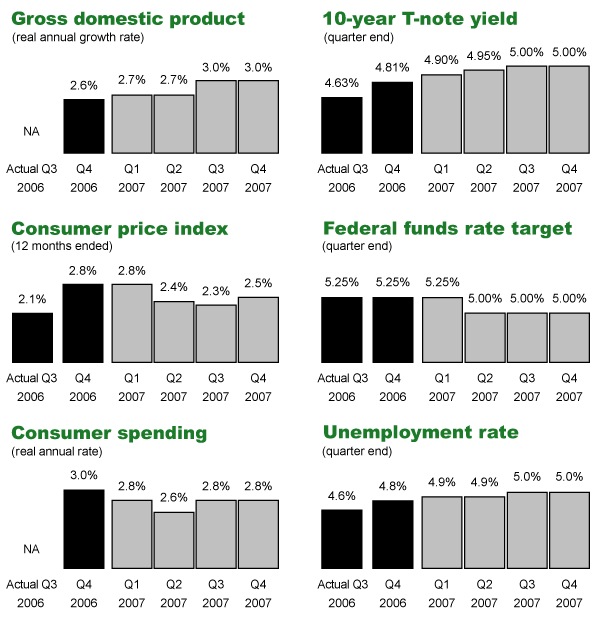|
October 25, 2006
Change in the Wind?
Written by Jeff Thredgold, CSP, President, Thredgold Economic Associates
National mid-term elections are less than two weeks away. In various polls conducted in recent days and weeks, the Republican majority in both the U.S. House of Representatives and the U.S. Senate could be in deep do-do (an economic term).
A change of Congressional leadership last occurred when the Republicans took control of both the House and the Senate in 1994, during President Bill Clinton’s first term. Recent polling suggests an even stronger urge among likely voters to rebel against current Congressional leadership than polls suggested in 1994.
During 1994, with voters upset then with scandal and failure to act on critical areas such as health care, voters favored Republicans taking control of the Congress by a six-point margin—44% to 38% for Democrats…
…that same poll today (conducted by The Wall Street Journal/NBC News) suggests voters favor Democrats taking back Congressional control by 52% to 37%.
Democrats currently need a net gain of six seats in the U.S. Senate and 15 seats in the House of Representatives to assume control. The current 15-point Democratic advantage is the widest ever registered by either political party in the Journal/NBC survey. It is also the first time that voter preference for one party has exceeded 50%.
Stumbles
It would be one thing politically if the Democrats had achieved such a lofty standing in the eyes of voters because of brilliant new proposals and dialogue that had great appeal to voters. Instead, Democrats have attained such a lofty perch solely through the stumbling of the President (primarily on Iraq) and the arrogance of the Republican “leadership” (the term is used loosely).
It’s no secret that our trials in Iraq and Afghanistan have cost this President greatly in terms of his popularity with voters. A majority of Americans cast negative votes as to the President’s performance in office, while an even greater majority question our role in Iraq.
The same Journal/NBC News survey notes that 32% of voters rate the Republican Party favorably. However, 49% rate Republicans negatively…the highest negative ever in the survey for either party.
My political leanings are conservative. However, I have written and spoken frequently during the past couple of years about the arrogance and spending excesses allowed by Republican Congressional leaders.
The Other White Meat
The Congress, which controls the nation’s purse strings, has seen pork barrel spending (known as earmarks) move to uncharted levels in recent years. Political favors and misdeeds have been excessive.
I really don’t mind a change in Congressional control. A move to split government in 1994, which continued during the final six years of the Clinton era, saw political gridlock engulf the nation’s capital.
Very little in the way of major legislation was passed during those six years. As a result, the economy was allowed to work its own magic, with limited government interference.
A Good Thing?
Some Republican strategists have noted that perhaps having the Democrats running the Congress during the next two years would in fact enhance the Republican chances of retaining the Presidency in the 2008 election cycle…
…a taste of numerous proposals to boost taxes and expand the role of government even further under new Democratic Congressional leaders Nancy Pelosi and Charles Rangel just might be the best thing Republicans could ask for…

Quarterly economic survey
|

|
The USA TODAY economic survey of 53 top economists was conducted October 13-18. Actual 3rd quarter 2006 numbers (if available) and median forecasts through 4th quarter 2007:
|
|
USA TODAY • MONDAY, OCTOBER 23, 2006
|
|
|
|
 |
Survey participants: Scott Anderson, Wells Fargo; Nariman Behravesh, Global Insight; Richard Berner, Morgan Stanley; David Berson, Fannie Mae; Kathleen Camilli, Camilli Economics; J. Dewey Daane, Vanderbilt University; Richard DeKaser, National City; Rajeev Dhawan, Georgia State University; Douglas Duncan, Mortgage Bankers Association of America; Michael R. Englund, Action Economics; Gail Fosler, The Conference Board; Lyle Gramley, Stanford Washington Research Group; Ethan Harris, Lehman Brothers; Maury Harris, UBS; Tucker Hart Adams, The Adams Group; Stuart Hoffman, PNC Financial Services Group; David Huether, National Association of Manufacturers; William Hummer, Wayne Hummer Investments; Saul Hymans, University of Michigan; Bruce Kasman, JP Morgan; Paul Kasriel, The Northern Trust; David Kelly, Putnam Investments; David Lereah, National Association of Realtors; Timothy Martin, Bank of America; Ken Mayland, ClearView Economics; Robert McGee, US Trust; Jim Meil, Eaton; Gregory Miller, SunTrust; Joel Naroff, Naroff Economic Advisors; Frank Nothaft, Freddie Mac; Joel Prakken, Macroeconomic Advisers; Maria Ramirez, Maria Fiorini Ramirez; Donald Ratajczak, Morgan Keegan; Martin Regalia, U.S. Chamber of Commerce; David Resler, Nomura Securities International; Timothy Rogers, Briefing.com; Christopher Rupkey, The Bank of Tokyo-Mitsubishi UFJ; John Ryding, Bear, Stearns; David Seiders, National Association of Home Builders; Robert Shrouds, DuPont; Allen Sinai, Decision Economics; James Smith, Parsec Financial Management; Sean Snaith, University of Central Florida; Sung Won Sohn, Hanmi Bank; Donald Straszheim, Roth Capital Partners; Diane Swonk, Mesirow Financial; Gary Thayer, A.G. Edwards; Jeff Thredgold, Thredgold Economic Associates; Mark Vitner, Wachovia; Brian Wesbury, First Trust Advisors; David Wyss, Standard & Poor’s; Rich Yamarone, Argus Research; Mark Zandi, Moody’s Economy.com

“Tea”ser
Oh, I don’t blame Congress. If I had $600 billion at my disposal, I’d be irresponsible, too.
—Lichty and Wagner
|

